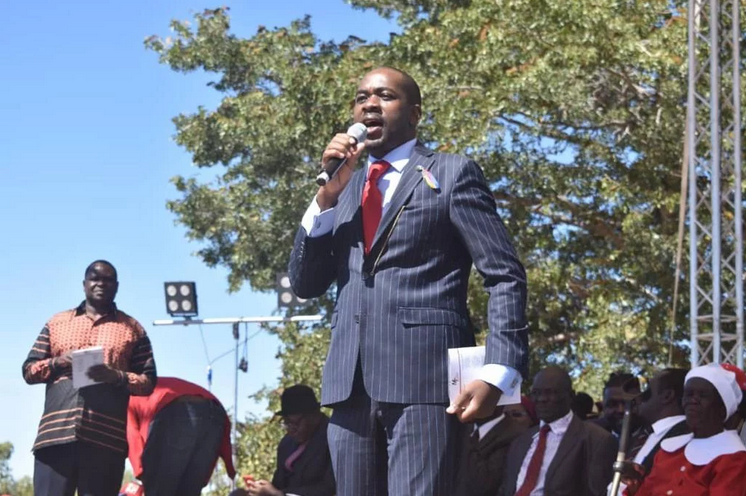A MONTH after out-manoeuvring his MDC competitors at the party's Gweru congress, opposition leader Nelson Chamisa, pictured, yesterday moved to consolidate his power - demoting some of the party's stalwarts and also making unexpected appointments to its national executive.
The charismatic 41-year-old demoted the party's respected former secretary-general, Douglas Mwonzora - who will now deputise activist Gladys Hlatywayo, whom he appointed as the MDC's new international relations secretary.
Former MDC vice president, Elias Mudzuri, was appointed to be the party's local government secretary, while another bigwig, Tapiwa Mashakada - who is the MDC's former treasurer-general - is now secretary for policy, deputised by Kuwadzana MP Miriam Mushayi.
Former party spokesperson Jacob Mafume is now the party's secretary for elections. He was replaced by Chamisa's strong ally, Daniel Molekele - who lost his bid to be the party's secretary-general in Gweru.
Former presidential spokesperson Luke Tamborinyoka has bounced back as the party's deputy spokesperson.
Chamisa also made an unexpected appointment when he made lawyer Fadzayi Mahere the party's new secretary for education, sports and culture.
However, the opposition leader rescued losing vice presidential candidates Morgen Komichi and Lillian Timveos, who were appointed secretary for presidential affairs and deputy secretary respectively.
Other bigwigs who were accommodated in the new team include Happymore Chidziva (deputy organising secretary), Murisi Zwizwai (deputy treasurer), Jameson Timba (deputy secretary-general), Consilia Chinanzvavana (deputy secretary-general) and Costa Machingauta (intelligence).
Yesterday's appointments confirm the fact that seismic waves continue to rock the country's main opposition since its revered founding leader, Morgan Tsvangirai, passed away early last year.
So extensive and far-reaching have been the MDC's leadership changes, that fears have been expressed in some quarters of the party that this could further divide the main opposition — after untested allegations of vote-rigging were made in Gweru.
The fears were stoked after electricity supply at Ascot Stadium, the venue of the May elective congress, was cut off just as the main elections got underway — resulting in officials utilising vehicle headlights to conduct the polls, in unprecedented scenes which displeased some constituents who immediately raised questions of transparency and credibility of the voting process.
Political analysts who spoke to the Daily News after the congress urged Chamisa — who was elected uncontested — to accommodate some of the losing candidates, just as Tsvangirai had done to him in 2014, in an endeavour to unite the strife-torn MDC.
"He (Chamisa) has to embark on massive reforms to make the MDC democratic once again. He also has to ensure a pro-poor, pro-worker ideology and not pursue neo-liberal, capitalist policies like Zanu-PF ... This will not be easy," political analyst Maxwell Saungweme said.
"From here, Chamisa and his leadership also have a lot of work to do to unite the party and to distinguish themselves from Zanu-PF in terms of policies, the penchant for personality cultism and unconstitutionalism," he added.
But Nambia-based scholar Admire Mare said the fall of the MDC heavyweights was "part and parcel of elections" and should not be viewed as a threat to the party's existence.
"The members of the party must be able to vote in and out its cadres without necessarily treating those individuals in current positions as ordained forever by some deity.
"Unfortunately in Zimbabwean politics, renewal through bringing new blood is part of our political DNA. We tend to believe that one person is more important than the party.
"Individuals come and go, but the party must always be strong and cohesive. If the winners and losers take it in with the right attitude, I'm sure the party will emerge stronger and united," Mare said then.
The MDC was last year hit by power struggles shortly after the death of Tsvangirai, when Chamisa assumed the reins of the party ahead of his rivals — albeit, under controversial circumstances.
The 41-year-old was accused of having allegedly used his then assumed closeness to Tsvangirai's widow, Elizabeth, to torpedo the ambitions of the likes of Mudzuri and the then other party vice president, Thokozani Khupe.
- dailynews
 Concern over Masvingo black market
Concern over Masvingo black market  Kenya declares three days of mourning for Mugabe
Kenya declares three days of mourning for Mugabe  UK's Boris Johnson quits over Brexit stretegy
UK's Boris Johnson quits over Brexit stretegy  SecZim licences VFEX
SecZim licences VFEX  Zimbabwe abandons debt relief initiative
Zimbabwe abandons debt relief initiative  European Investment Bank warms up to Zimbabwe
European Investment Bank warms up to Zimbabwe  Young Investment Professional (YIP) Graduate Programme 2019
Young Investment Professional (YIP) Graduate Programme 2019 











 Young Investment Professional (YIP) Graduate Programme 2019
Young Investment Professional (YIP) Graduate Programme 2019
Editor's Pick